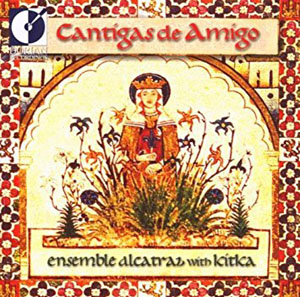This review was written by Brendan Foreman for a previous incarnation of GMR.
 I’m beginning to suspect that eventually Dorian will have released a version of every single piece of Iberian medieval music still extant. This is by all means a good thing: although the current booms in Celtic and English traditions are nice, there are plenty of older and just as appealing musical traditions from the Continent that need our attention — particularly from the Iberian peninsula. What makes these Dorian releases so good is the wide variety of sounds that they showcase. I’ve reviewed several of these releases by such groups as La Rondinella, Sarband and Sonus, and I’ve yet to encounter much of a stylistic repetition. Each of these groups puts their own unique feel to the music.
I’m beginning to suspect that eventually Dorian will have released a version of every single piece of Iberian medieval music still extant. This is by all means a good thing: although the current booms in Celtic and English traditions are nice, there are plenty of older and just as appealing musical traditions from the Continent that need our attention — particularly from the Iberian peninsula. What makes these Dorian releases so good is the wide variety of sounds that they showcase. I’ve reviewed several of these releases by such groups as La Rondinella, Sarband and Sonus, and I’ve yet to encounter much of a stylistic repetition. Each of these groups puts their own unique feel to the music.
The latest to pop up in this category is Ensemble Alcatraz, a San Francisco-based group who, with the help of Kitka, an eight-person woman’s vocal ensemble, and members of Angelorum, a medieval harp choir, have produced an amazing and bewitching CD, Cantigas de Amigo. Translated “Songs for a friend,” this is a set of 13th-century Galician and Portuguese secular songs and dances, all written for the female voice and based on themes of love and longing for the absent beloved.
The reader may recall that this is the very same source material as a previous Dorian release, Sonus’ Echoes of Spain. However, both of these groups put such individual stamps on the material that the contrast between the two is quite striking. Whereas Sonus plays its music with stately, almost aristocratic grace, Ensemble Alcatraz features a looser, more forthright sound. Both groups manage to reveal remarkably different aspects of the same source material!
Ensemble Alcatraz has been together since 1984, apparently building a sizable fanbase since then. This is their third release after Visions and Miracles and Danse Royale, both on Elektra/Nonesuch. It consists of Cheryl Ann Fulton on harp, Kit Higginson on recorder and psaltery, Shira Kammen on vielle and rebec, Peter Maund on percussion, and Susan Rode Morris on vocals. Kitka is a woman’s vocal group, famous for their interpretations of Eastern European women’s music. Their music has been featured in a number of movies such as Braveheart and Jacob’s Ladder.
The verve and imagination that Ensemble Alcatraz apply to their music really stand out in this recording. Their enthusiasm for the music gives it a fervor that I’ve heard more at Irish ceilidhs than at any early music recitals. And, in fact, in a few of the instrumental tracks, such as “Alvorada,” which was inspired by traditional Portuguese melodies, the ensemble members are clearly “jamming” to the tunes, passing solos back and forth to each other. Sometimes their playing sounds like the typical medieval dance tune. “Alborada,” a fairly simple drum and flute song; at other times, they let their interpretative skills run wild, as in their “fantasia” arrangement of “Cantiga de Santa Maria #1.” To anyone familiar with medieval Spanish music, this is a very familiar tune, which Alcatraz has turned into a mysterious, contemplative air.
Alcatraz’s spark is enhanced twofold by Kitka, who sing most of the songs. The first track, Cantiga 380 “Sen calar”(“Without being silent”), is a hauntingly rich choir piece in adoration of the Virgin Mary. With a relatively sparse instrumental background, Kitka make full use of the eight voices at their disposal, filling out the sound beautifully. In another track, “Sen meu amigo (Without my lover),” a single voice and a single violin plaintively describe a lonely woman’s longing for her absent lover.
The sprightly “Enas verdes ervas (On the rivers of green grass)” has a rather typical medieval-sounding melody to it, although the tune itself was written by Shira Kammen. The Ensemble uses a mournful Catalan tune to back up “Por Deus (For heaven’s sake),” in which the singer tells her parents that she’s setting off to San Salvador to meet her lover.
All of Kitka returns to sing “Levantous’ a velida (The girl arose so gracefully),” a bright, rather poetic choral piece describing a girl’s morning laundry routine. They follow this with another bright dance song, “Bailemos nos ja todas (Let’s dance now).” Both of these tracks are brimming with vigor and enthusiasm.
Like Sonus’ Echoes of Spain CD, Cantigas de Amigo ends with the seven “Cantigas de Amor” from the Martin Codax. All dedicated to absent love, they vary in sound and emotion: from hopeful pining (“Oh God, will he soon come to me?”) and outright exuberance (“A message tells me/that my friend is coming”) to complete desperation (“Oh God, if my friend only knew/how lonely I am in Vigo!”) and sensual yet chaste celebration (“I danced with my slender body/That has never known a lover”). As I’ve noted before, the Ensemble brings out a certain forthrightness and emotiveness that contrasts quite interestingly with the Sonus recordings.
In a field of music that can often seem unnecessarily conservative and maybe even a little stodgy at time, Ensemble Alcatraz clearly show that this music is as alive and vibrant as it possibly was when it was the modern music of its day. In fact, I wish most recordings of our modern music were this entertaining.
(Dorian, 2000)
